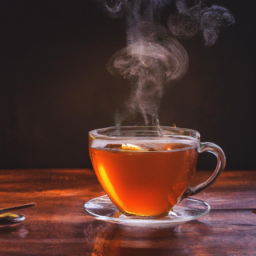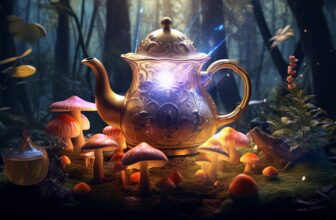
Can’t seem to shake off that queasiness after savoring your favorite black tea? You’re not alone! I’m going to shed some light on this seemingly odd phenomenon. The article titled “Understanding Why Black Tea Can Cause Nausea” explores the detailed explanation behind this biological response. We’ll be breaking down the science of how different compounds found in black tea can potentially trigger a bout of nausea in some people. With every sip you take, you’ll gain a deeper understanding of why your body might react the way it does.
Understanding Black Tea Composition
Hello there! Let’s chat a bit about black tea – that rich, dark concoction that has worked its way into many a culture and routine. I believe nothing is quite as wonderful as sipping on a cup of perfectly brewed black tea. But what gives black tea its unique identity?
Origins of black tea
Often, when we think of tea, our minds usually envision the calming green variant. However, black tea, its bolder cousin, has an immersive history worth noting. Black tea originated in China and quickly spread across the globe due to its robust flavor and longer shelf life in comparison to green tea. Now, it is cultivated in many parts of the world, most notably India, Sri Lanka, and Africa.
Major ingredients in black tea
Black tea, like all tea, comes from the Camellia sinensis plant. What differentiates black tea from green or white tea is its processing. Black tea leaves undergo a full oxidation process, allowing for a stronger flavor and a darker color. Apart from the tea leaves, black tea often contains additional flavorings like bergamot (famous in Earl Grey), spices, or fruits. That’s why you’ll find a wide variety of black tea types, each singing a different tune on your taste buds!
The caffeine content of black tea
Caffeine is an integral component of black tea and serves as a gentle stimulant. The caffeine content in black tea is usually less than coffee but more than green tea, averaging around 40-70 milligrams per eight-ounce serving. This is one reason why some people choose black tea as their morning kickstarter.
How Black Tea Affects the Digestive System
While black tea is often celebrated for its taste and potential health benefits, it’s crucial to understand its effects on our digestive system.
Stimulation of stomach acid
In moderation, black tea can aid digestion due to its caffeine content. It stimulates the production of stomach acid, which can help digest food more efficiently. However, if taken in excess, this same attribute can become a concern.
Can worsen symptoms of GERD
Those with gastroesophageal reflux disease (GERD) might experience worsening symptoms when consuming black tea. Due to its ability to stimulate stomach acid, black tea can aggravate the condition, leading to heartburn or discomfort.
Increases gastric movement and digestive activities
The caffeine content in black tea, while beneficial for our alertness, can also increase gastric motility. This can speed up digestion but might also lead to an upset stomach or a feeling of being ‘unsettled’ — especially in those who are more sensitive to caffeine.
Caffeine Impact on the Stomach
A lot of us enjoy the buzz that comes with caffeine, but it’s worth exploring how it affects our stomachs.
How caffeine stimulates acid production
Caffeine triggers the release of gastrin, a hormone that speeds up activity in the colon and increases stomach acid production. While some stomach acid is necessary for proper digestion, too much can lead to discomfort or conditions such as acid reflux.
The effects of excessive caffeine intake
While a little caffeine can perk you up, too much can lead to side effects like restlessness, a rapid heartbeat, and even stomach upset. This discomfort can manifest as nausea, especially if the caffeinated beverage is consumed on an empty stomach.
Interactions between caffeine and common digestive conditions
For individuals with sensitive stomachs or conditions like GERD and irritable bowel syndrome (IBS), caffeine can exacerbate symptoms. As a stimulant, it can cause the stomach to produce more acid and speed up digestion, leading to discomfort.
Tannins Role in Nausea
Chances are you’ve heard of tannins but might not know exactly what they are or how they contribute to nausea. Let’s break it down!
Introduction to tannins
Tannins are a type of polyphenolic compound found in many common foods and beverages, including wine, chocolate, legumes, and of course, black tea. They are responsible for that slightly bitter, dry sensation you experience when consuming these foods and drinks.
How tannins can promote nausea
In large amounts, tannins can cause an upset stomach and promote feelings of nausea. This is due to their interference with the body’s ability to absorb certain nutrients, specifically iron.
Tannins interactions with nutrients in the body
Tannins have been known to limit the absorption of non-heme iron, a form of iron found in plant foods. This happens because tannins can bind to iron, making it harder for our bodies to absorb. Anyone with a diet already low in iron or a pre-existing condition of anemia should take this into consideration when consuming large amounts of black tea or other tannin-rich foods.
The Influence of Other Ingredients
Black tea doesn’t always come solo. Other ingredients, additives, and even the technique of brewing can influence the tea experience.
Effects of additional flavorings or additives
Black tea often comes paired with various flavorings like spices, fruits, or herbs. Some of these might also influence how your stomach reacts to black tea. For instance, mint and ginger are known stomach-soothers. They can help mitigate any discomfort that the black tea’s caffeine or tannins might bring. On the other hand, some additives or flavorings can be triggers for certain individuals, so it’s always good to stay mindful.
Impact of milk and sugar on black tea
Adding milk and sugar to tea is quite popular, particularly in various cultural practices. These additions can change the nature of your cup. Some studies suggest that milk proteins can bind to tea tannins and reduce their negative effect. Sugar, on the other hand, may worsen nausea for some individuals, especially when consumed in large quantities on an empty stomach.
How different brewing techniques can affect nausea
The way you brew your tea can influence its strength and, consequently, its effect on your stomach. Longer brewing times can make the tea stronger, bringing out more caffeine and tannins. If you’re sensitive to these factors, a short brewing time might be a better option.
Adverse Reactions to Black Tea
Just as people are unique, our reactions to black tea can also be diverse. For some, it’s their potion of choice, while for others, it can lead to discomfort.
Common side effects of black tea
Common side effects of consuming black tea, especially in large amounts, include headaches, nervousness, sleep problems, vomiting, diarrhea, and irritability. Although these effects are typically associated with excess consumption, individual tolerance varies.
Understanding individual intolerance or allergies
Some people may have an intolerance to black tea that can manifest as nausea, stomach cramps, or other digestive issues. Additionally, while rare, some people may have an allergic reaction to black tea, which can include symptoms such as hives, trouble breathing, and swelling of the mouth or throat. If you suspect you may have a black tea allergy, it is advised to consult with a healthcare provider.
Rare but serious reactions linked to black tea consumption
While most reactions to black tea are relatively mild, there can be rare but serious reactions in some individuals. These can include irregular heartbeat, confusion, convulsions, and in extremely rare cases, liver damage. These side effects are often linked with excessive consumption.
Factors Influencing Black Tea Nausea
Nauseated feelings from black tea, like any food or beverage, are highly individual. They can depend on a myriad of factors from your diet to your genetic makeup.
Impact of individual’s diet and lifestyle
Your overall diet can play a role in how your body handles black tea. Those who consume a balanced, healthy diet rich in variety are likely to handle black tea better than those whose diets are unbalanced or lacking in key nutrients. Additionally, lifestyle factors, such as regular exercise and hydration, can also play a role in minimizing digestive discomfort.
The role of pre-existing health conditions
Individuals with certain pre-existing conditions, like GERD, IBS or a peptic ulcer, may experience aggravated symptoms when consuming black tea. This is due to black tea’s ability to stimulate the stomach lining and increase acid production.
Consideration of genetic factors and resilience to caffeine
Genetics also play a key part in how caffeine affects us. Certain genetic factors can determine how quickly or slowly our bodies metabolize caffeine, which can in turn affect its impact on our digestive system.
Preventing Nausea from Black Tea Consumption
The good news is that even if you’re susceptible to black tea nausea, there are steps you can take to minimize this effect. Let’s explore those.
Adjusting the brewing method
A milder brew might just do the trick, especially if your nausea is due to the strength of your tea. Shortening the brewing time can reduce the quantity of both the caffeine and the tannins that get into your cup.
Choosing low-caffeine or decaffeinated black tea
For those who are particularly sensitive to caffeine, considering a low-caffeine or decaffeinated alternative could be handy. Although bear in mind, decaffeinated doesn’t mean caffeine-free – it just contains a lot less of it.
Incorporating food or snacks during tea time
Making sure to have a little something to eat around your tea time can help protect your stomach from getting irritated by any of the tea’s components. Some crackers, a piece of fruit or a handful of nuts could be the perfect tea-time companion!
Practicing mindful tea consumption
Awareness of your body’s cues is key. Being mindful about when and how you consume tea can prevent instances of nausea. Think about the portion size, the concentration of your tea, and timing in relation to meals. Listen to your body – it knows best!
Medical Opinions on Black Tea and Nausea
Medical opinion varies when it comes to black tea and nausea. Let’s take a look at some viewpoints.
Studies supporting the link between black tea and nausea
Some studies have pointed out that high consumption of black tea can lead to nausea or other digestive discomfort, primarily pointing to its caffeine and tannin content.
Controversies and debates in the medical community
At the same time, there’s plenty of research extolling the health virtues of black tea – from liver health to cancer prevention to heart health. As with many things in the medical and health world, the key is often balance and moderation.
The balance between health benefits and potential risks of black tea
While black tea’s potential side effects–including nausea–should not be overlooked, neither should its health benefits. It is a good source of antioxidants and has potentially protective effects against heart disease and certain types of cancer. It’s about finding the right balance that works for your body.
Exploring Alternative Tea Options
If black tea makes you nauseous, fret not! Thankfully, the world of tea is vast and varied, and there are many other types of teas and infusions to explore.
Introduction to other types of tea
Variations in tea processing techniques result in different types of tea, including green tea, white tea, and oolong tea. Each has its unique flavor profile and health properties, and may be more gentle on your stomach than black tea.
Herbal teas for sensitive stomachs
Herbal teas can be a great option for those with sensitive stomachs. Peppermint tea is known to soothe the digestive system, chamomile can aid in relaxation and sleep, and ginger tea can help with nausea.
Decaffeinated alternatives for tea lovers
If caffeine is your primary concern with black tea, you may want to opt for decaffeinated teas. Although remember – decaffeinated doesn’t mean no caffeine, but the levels are significantly reduced.
So, now you have an understanding of why black tea might make you nauseous and the various factors at play. But remember, tea, like everything in life, is best enjoyed in moderation. Respect your body’s cues and enjoy your tea journey!
Hi, I’m Mat Boehmichen, the author behind The Tea Masters Hub. I’m passionate about all things tea and I want to share that passion with you. At The Tea Masters Hub, my mission is to provide you with all the knowledge and resources you need to truly understand and appreciate tea. Whether you’re a novice or a seasoned tea enthusiast, I’m here to guide you on your tea journey. From the art of preparation to the joy of sipping, I’ll teach you everything there is to know about tea. So join me on this flavorful adventure and let’s explore the world of tea together.








